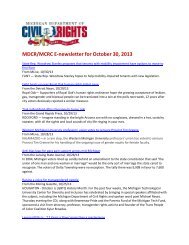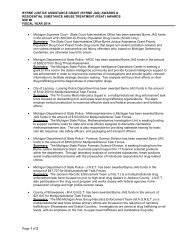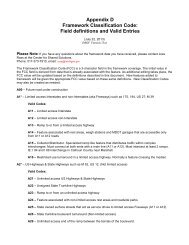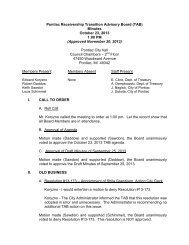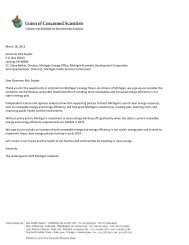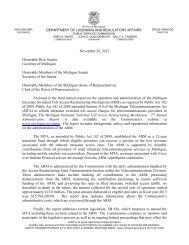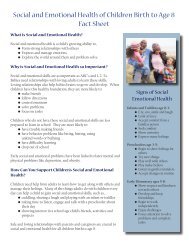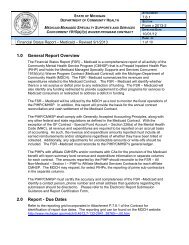michigan hypertension core curriculum - State of Michigan
michigan hypertension core curriculum - State of Michigan
michigan hypertension core curriculum - State of Michigan
Create successful ePaper yourself
Turn your PDF publications into a flip-book with our unique Google optimized e-Paper software.
etween adult socioeconomic position and pregnancy induced <strong>hypertension</strong> have found<br />
contradictory results.<br />
4. BMI and maternal weight gain: There are few modifiable risk factors for pregnancy-related<br />
hypertensive disorders, but body mass index (BMI) and maternal weight gain may be important<br />
factors. A recent prospective cohort study 7 found that preconception BMI> 30 was a risk factor<br />
for preeclampsia (OR 3.3) and severe transient <strong>hypertension</strong> (OR 8.8 in Caucasian women and<br />
4.9 in Black women). High gestational weight gain was also a risk factor or, alternatively, was<br />
associated with risk factors for pregnancy induced <strong>hypertension</strong> 8 and preeclampsia. 9<br />
There is no single effective screening test that predicts preeclampsia.<br />
Management<br />
Evaluation and counseling <strong>of</strong> women with chronic <strong>hypertension</strong> should begin before conception<br />
and should include screening for target organ damage (including baseline measurement <strong>of</strong> renal<br />
function and proteinuria), and evaluation for secondary causes <strong>of</strong> <strong>hypertension</strong>. It is essential before<br />
conception that the patient’s antihypertensive medications be reviewed and that those drugs harmful to<br />
the developing fetus (angiotensin-converting enzyme [ACE] inhibitors, angiotensin II receptor blockers)<br />
be discontinued and replaced with medications considered safe for use during pregnancy (methyldopa,<br />
labetalol).<br />
It has to be recognized from the outset that the selection <strong>of</strong> a particular drugs to treat<br />
<strong>hypertension</strong> during pregnancy is all opinion based except for the avoidance <strong>of</strong> a small number <strong>of</strong> drugs<br />
known to be harmful to the fetus (e.g., ACEIs and ARBs as noted above). Only a few antihypertensive<br />
medications are recognized as being safe for use in pregnancy. No antihypertensive medication has<br />
specifically been proven safe for use during the first trimester It is exceeding difficult for ethical reasons<br />
to conduct randomized controlled trials during pregnancy. A recent Cochrane review 10 was only able<br />
to conclude “Until better evidence is available, the choice <strong>of</strong> antihypertensive should depend on the<br />
clinician’s experience and familiarity with a particular drug, and on what is known about adverse<br />
effects. Exceptions are diazoxide, ketanserin, nimodipine and magnesium sulphate, which are probably<br />
best avoided.” The reader is also referred to recent comprehensive reviews on the management <strong>of</strong><br />
hypertensive disorders during pregnancy 11-13<br />
Gestational vasodilation frequently allows the discontinuation <strong>of</strong> most or all antihypertensive<br />
medications early in pregnancy, although some may need to be restarted closer to delivery. Although<br />
bed rest is recommended for women with <strong>hypertension</strong> and preeclampsia, there is no evidence to show<br />
that it improves outcomes <strong>of</strong> pregnancy.<br />
There is no evidence from controlled trials that antihypertensive drugs improve maternal<br />
or fetal outcome in mild to moderate <strong>hypertension</strong> (BP< 160/110), whether pregnancy-induced or<br />
chronic. Not surprisingly, guidelines vary as to recommended thresholds for initiating antihypertensive<br />
medications. The most recent US guidelines advise treatment at ≥ 160/105 3 . Severe <strong>hypertension</strong> (≥<br />
160/110 requires prompt treatment to reduce the risk <strong>of</strong> maternal intracerebral hemorrhage or death.<br />
It is important that the obstetrical service or obstetrician be involved in women with a gestational age<br />
beyond 24 weeks to assist in antihypertensive management decisions that may affect the fetal status,<br />
as well as decide if or when emergent delivery is indicated.<br />
262 Hypertension Core Curriculum




